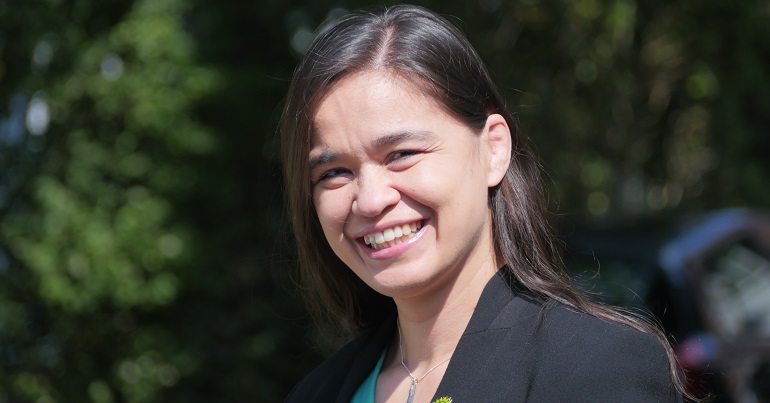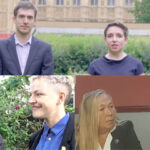What I learnt from the Green Party leadership election, and what I’m doing next

My decision to run for leader was a spur of the moment decision, but one that’s been a couple of years in the making.
It was motivated by the hundreds of conversations that I’ve had with people since first announcing that I was going to stand as a local councillor for the Green Party. From canvassing on doorsteps, to chatting with friends and family and social media debates with former sparring partners, I found a huge number of people who care about all the same things that we do. They’re concerned about the political situation facing our country, they want to live in a more equal society with strong public services and vibrant local communities, and are worried that we are all sleepwalking into a growing climate emergency. Yet many of them don’t vote Green. I wanted to understand why.
Over the course of these conversations, I found that the same stereotypes kept coming up. The idea that we were a single issue pressure group, rather than a serious political party; the perception of us as a lifestyle movement for white, middle class hippies rather than a party serious about social justice and system change; and the belief that voting for us was a wasted vote, because we just couldn’t win.
I knew that as a relative unknown in the party, I’d have my work cut out in persuading people to vote for me. I fully expected resistance, and maybe even resentment from those who have been around much longer than I have. At the same time, this was a chance to push a debate within the party about who we are and where we go from here; and it was too good an opportunity to turn down.
Together with a small campaign team, we worked out the ideas that we wanted to get across. Starting with a big list of points we wanted to address, we boiled it down to three key themes; three things that the party needed to do better in order to attract the votes of those natural allies. Serious about inclusion, serious about credibility, serious about winning elections.
In reality, I underestimated just how much that message would resonate with people. When I announced I was standing, I started getting emails and responses on social media from people all over the country telling me that they were grateful I was saying things that many people were thinking. As the campaign went on, that wasn’t limited to Green Party members either. Increasing numbers of Labour and Lib Dem voters also indicated that this was a message that could persuade them to join us. Activists and campaigners offered their support, and previously inactive members told me that I’d inspired them to get more involved. People told me that they wanted a party that prioritised the environmental crisis we’re facing, but that could also speak confidently about all the other political issues they were concerned about.
Some of the feedback was more challenging. Questioning some of our entrenched positions on certain issues (such as HS2) wasn’t always popular, but I’ve always felt it important to make the difficult arguments which might challenge people’s existing views, instead of taking the easier route of ducking those controversial topics. It’s been heartening to see how many people have been prepared to look again at their preconceptions, and (whether they agree or disagree) commit to a higher quality of debate around these topics.
The only topic on which I received outright abuse (not by and large, I hasten to add, from Green Party members) was when the issue of trans rights came up. Sadly, there appear to be some highly toxic factions on social media whose interest in our leadership elections was entirely focused around this particular issue. I know I wasn’t the only candidate in these elections to receive this, and that it’s only a small taste of the kind of thing our trans members face all the time. In a society in which trans people all too often find themselves collateral damage in the culture war, our party must take a clear, unambiguous stance against harassment and discrimination towards them (or any of our other minority groups).
In the end, new faces don’t win leadership elections. But going from a standing start to a strong second place in less than eight weeks, taking the incumbents to second preference votes for the first time in the party’s history, and receiving 36% of the votes in the final round shows the strength of that message, and it’s one that I hope the party will listen to as we move forward.
Lots of people have asked what’s next for me, and whether I’ll be taking on more of a national role in the party. Jonathan and Sian have both been very gracious, and have recognised the importance of tackling the issues that I’ve raised during the campaign. I know that we agree on many important points, and I’m looking forward to working together now to address them.
In the last week, I’ve been elected as Chair of the Association of Green Councillors. Our councillors are at the heart of our movement. They are the Greens in the room who are able to influence important decisions as they are made, who are working to revitalise local communities, and to improve the lives of the local residents we represent. They are already pushing our party to be more inclusive, more credible, and to win more elections. I’m looking forward to using this role to support and promote the brilliant work being done by Green councillors, and to spread the message far and wide about the difference that elected Green politicians are already making.
As to whether I’ll stand again next time around – I’ll certainly consider it. Lots can happen in a few years, but I believe, as I said during the campaign, that our country needs a Green Party that is competitive and effective. A Green Party that represents every class, every colour and every community. A Green Party that combines a bold vision of a better future with a clear understanding of what works. And a Green Party that knows we must win elections, so we can hold the establishment to account. I believe that alone amongst political parties in England and Wales we have the potential to offer a genuinely exciting, progressive, political programme for the 21st century. That’s something I intend to keep fighting for.
PS. We hope you enjoyed this article. Bright Green has got big plans for the future to publish many more articles like this. You can help make that happen. Please donate to Bright Green now.




I imagine he means Rosi Sexton. i take it he knows her and feels she has ignored his questions. . yes the correct thing to do would be to ask the questions one more time here but in away that relates to this article and if they ignored people can draw there own conclusions about both the questions and the article using there own judgement.
I did nt vote for Rosi in the end but if she had wanted to beat Johnathan Bartley she should have started getting her name around and meeting branches before the election not making a last minute decision. Rosi beware of being patronised by the clique who run the Green Party now and instead stay local and build the party locally,
Glad to see that the candidate I voted for – although she didn’t win – made a good impression, and continues to reveal herself as a serious politician. Will be following her career with interest.
Let’s get serious!
Inspiring words and a clear vision from Rosi.
Why don’t you answer my questions? This is self indulgent nonsense. You will never get anywhere, if you fail to respond to potential supporters.
Who is ‘you’ here?
What question do you have?
It’s not reasonable for every individual to expect personal attention from a politician, but I’m sure if others can answer your question, then they will.